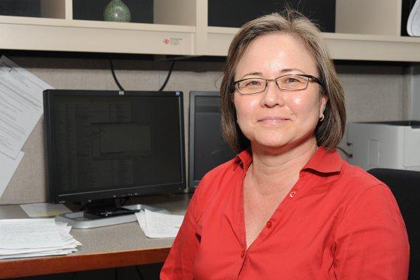The Robert Larner, M.D. College of Medicine at The University of Vermont is proud to present the inaugural Dean’s Excellence in Research Awards event, titled “Celebrating Excellence in Research,” on Tuesday, November 1, 2016 at 4:00 p.m. in Carpenter Auditorium in the Given Building.

Lita Proctor, Ph.D., Program Director for the Human Microbiome Project in the Division of Genome Sciences at the National Institutes of Health (NIH photo)
The Robert Larner, M.D. College of Medicine at The University of Vermont is proud to present the inaugural Dean’s Excellence in Research Awards event, titled “Celebrating Excellence in Research,” on Tuesday, November 1, 2016 at 4:00 p.m. in Carpenter Auditorium in the Given Building.
Lita M. Proctor, Ph.D., program director for the Human Microbiome Project in the Division of Genome Sciences at the National Institutes of Health (NIH), will deliver a keynote address, titled “NIH’s Human Microbiome Project and Future Directions in Microbiome Research” during the event.
Proctor, who received a Ph.D. from the State University of New York, Stony Brook, is formally trained in microbial ecology and was an NSF postdoctoral fellow in molecular microbial genetics at the University of California, Los Angeles. In her role at the NIH, Proctor is responsible for coordinating the Human Microbiome Project (HMP), a ten-year investment by NIH to produce the needed tools, technologies, protocols and reference data to catalyze this nascent field of biomedical research. She joined the Division of Genomic Sciences in the Extramural Research Program at NIH in 2010. Prior to this, she served as program director at the National Science Foundation (NSF) in the Geosciences and the Biosciences Directorates, where she managed microbiological, bioinformatics and research resources programs. She has also held appointments at Florida State University and at the University of California, Santa Cruz.
During the first phase of HMP (2008-2012), resources which were developed included bacterial, viral and fungal strains and their genome sequences, phylogenetic and metagenomic sequence data from the microbiomes of healthy adults and from a collection of cohort studies of patients with specific gut, skin or urogenital diseases. Computational tools for phylogenetic and metagenomic data analysis, and single cell genomics and novel cultivation approaches as well as ELSI studies in human microbiome research rounded out the resources for this phase. For the second phase of HMP (2014-2016), an integrated dataset of biological properties, to include transcripts, proteins and metabolites, from both the microbiome and host will be developed as a community resource. These datasets are being developed from three different systems - IBD, diabetes and pre-term birth - as exemplar models of microbiome-associated conditions or diseases. Computational tools to analyze these complex datasets will also be developed as a resource. NIH now funds microbiome research at a very significant level.
During her keynore address, Proctor will briefly review the HMP, the areas of research now funded by the NIH and future directions for the human microbiome field. In light of the recent announcement of White House’s National Microbiome Initiative, she will also discuss the emergence of microbiome research as a discipline across the sciences.
A reception will be held following the event in the Hoehl Gallery on the first floor of the Health Science Research Facility at the College.